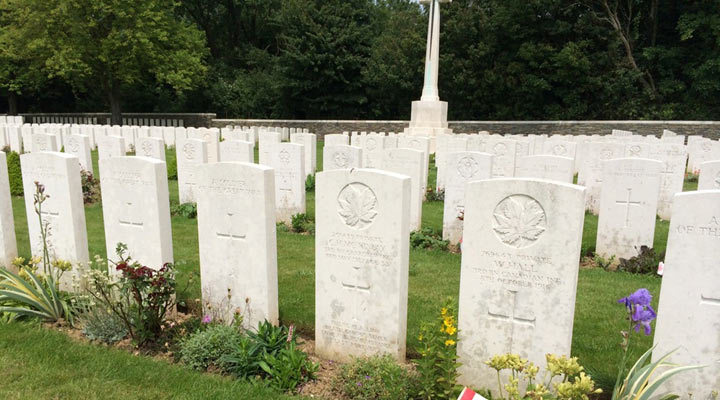WATCH ABOVE: The battle of Vimy Ridge was the first time Canadian soldiers fought together as a unified force instead of being dispersed through the ranks of the British Army. Global’s Stuart Greer traveled to Vimy and explains why it’s not just Canadians who are making the pilgrimage this year.

TORONTO – It’s been 100 years since Europe’s major powers, Canada and their other colonies and dominions went to war, but the passage of time has done little to settle the debate about who or what was responsible for the First World War.
The war was considered a turning point in Canadian history, when the country shed its colonial mindset to become a nation in its own right.
Prime Minister Stephen Harper marked the centenary of the beginning of the First World War at a ceremony on Parliament Hill Monday morning, calling the occasion a time to “remember and honour the sacrifices and tremendous achievements of the more than 650,000 brave Canadians and Newfoundlanders who left their families and the comfort of their homes to serve their King and country, as well as to preserve the universal values of freedom, peace and democracy that we hold most dear.”
GALLERY: Global News’ Stuart Greer visits the WWI trenches, the Canadian and Commonwealth WWI cemetery, and the monument to the Canadians killed in and around Vimy, France.
In all, about 620,000 Canadians enlisted during the war and about 419,000 went overseas. About 60,000 would never come home.

Get daily National news
“It is a source of deep national pride that the bravery and courage of our service members helped ensure Allied victories in important battles at places like Vimy Ridge, Passchendaele and Amiens,” said Harper.
“These efforts played a vital role in finally bringing about the negotiation and conclusion of the Armistice, which ended the First World War at precisely 11 a.m. on November 11, 1918.”
Canadian historian and author Margaret MacMillan is one of the leading authorities on World War I. Her new book The War That Ended Peace looks at the series of events that led Europe and the world down the path of destruction.
MacMillan told Global News reporter Stuart Greer there are many possible causes, and no agreement on how those causes interacted to spur the war in 1914.
“We still don’t know how it started. And that’s rather frightening,” said MacMillan.
“If we don’t know how it started, can we hope to avoid similar catastrophes in the future?”
WATCH: Margaret MacMillan explains why the way World War I started remains a “puzzle” today.
MacMillan said when Britain declared war, it did so without consulting parts of its empire such as Canada. This decision was accepted at the time, but proved to be a significant turning point, she said.
“A very important part of what happened to countries such as Canada … they became increasingly autonomous within the British Empire. They became increasingly willing and indeed insisting on taking control over their own affairs, including over foreign policy.”
WATCH: MacMillan on how Canada reacted to Britain’s declaration of war, and how Canada changed as a result.
When it comes to lessons learned, MacMillan suggested Ukraine is a potentially dangerous situation in today’s world, especially with what she calls Russia’s “strong feeling” that eastern Ukraine and Crimea should belong to Russia.
“What perhaps will prevent the situation in Ukraine from turning into the very dangerous situation before the First World War, is that so far, there’s only one power that is really making the running—and that’s Russia.”
WATCH: MacMillan weighs in on whether another major conflict could erupt in Europe today.
MacMillan doubts historians will ever settle the debate of what or who is to blame for the First World War, and that’s probably for the best.
“We shouldn’t be trying to tell even schoolchildren that there is just a simple explanation of the war,” she said.
“I think we should tell them that … there’s a discussion, and that it’s all right to have different views on what happened in history. Some things you just won’t get a consensus.”
WATCH: Global’s Stuart Greer takes us inside the trenches, bunkers, and craters at what was once the site of the battle of Vimy Ridge in the First World War.
With files from Global News’ Stuart Greer, The Canadian Press and The Associated Press
















Comments